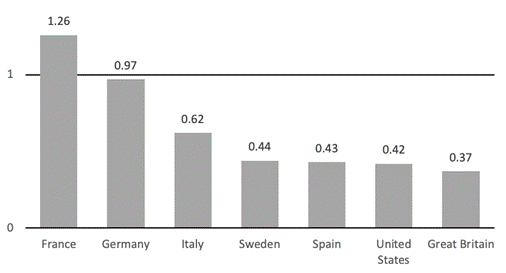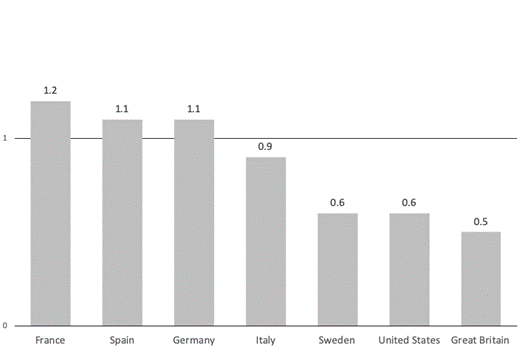What do people in different countries think about the rich? An international survey set out to answer this very question.
Ipsos MORI, and the Allensbach Institute for Public Opinion Research in Germany, conducted surveys involving at least 1,000 respondents in seven countries; in total, 7,644 people were interviewed.
The survey’s respondents were asked a range of questions to find out what percentage of the population in each country was envious of the rich (social enviers) and what percentage were not (nonenviers). Our seven-nation analysis reveals that approximately half of the populations of Sweden, the United States, Spain, and Great Britain are nonenviers. In France, Germany, and Italy, in contrast, the proportion of nonenviers is lower. At 33% and 34% respectively, the proportion of social enviers is highest in Germany and France. In order to calculate the Social Envy Coefficient, we worked out the ratio of enviers and nonenviers in each surveyed country. The following graph shows that social envy against the rich is lowest in Britain and highest in France.

In all seven countries, we also presented our respondents with a list of 14 personality traits and asked, “Which, if any, of the following are most likely to apply to rich people?”
Of the 14 personality traits, seven were positive: visionary/farsighted, industrious, bold/daring, imaginative, intelligent, optimistic, and honest. The remaining seven traits were negative: materialistic, greedy, self-centered, arrogant, superficial, ruthless, and cold-hearted. We then calculated the average percentage of positive traits and negative traits for each country and divided these two percentages to arrive at the Personality Trait Coefficient depicted in figure two, below.
Our comparative analysis of data from the first batch of surveyed countries was based solely on the Social Envy Coefficient. However, as we proceeded with our analysis, it became clear that the SEC alone did not give us the level of detail we need to depict a population’s attitudes toward the rich. In order to address this issue, we developed the Rich Sentiment Index as a combination of the Social Envy Coefficient and the Personality Trait Coefficient. The next graph, figure two, shows that people in Sweden, the United States, and Britain have much more positive attitudes toward the rich than do the populations of France, Spain, and Germany.

In four of the countries we surveyed, we also investigated whether general perceptions of the rich differ from the views held by people who know one or more millionaires personally. As our data clearly reveal, respondents who actually know a rich person offer a far more positive assessment of their wealthy acquaintance than the general population does of millionaires generally. Perhaps unsurprisingly, most people do not actually know any millionaires, and this has a definite effect on their views of the wealthy. In Germany, Italy, Spain, and Sweden, for example, an average of only 3%of respondents say that rich people are “honest,” compared with 28% of respondents who say the same about the rich person they know personally.
Rainer Zitelmann is a historian and sociologist and the author of the book The Rich in Public Opinion.
